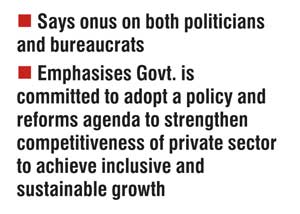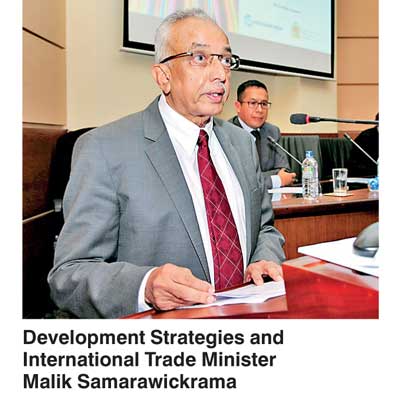Thursday Feb 19, 2026
Thursday Feb 19, 2026
Tuesday, 8 November 2016 00:01 - - {{hitsCtrl.values.hits}}
 Development Strategies and International Trade Minister Malik Samarawickrama yesterday called for a “mindset change” from both politicians and bureaucrats to boost much needed competiveness of the country to become a successful export nation.
Development Strategies and International Trade Minister Malik Samarawickrama yesterday called for a “mindset change” from both politicians and bureaucrats to boost much needed competiveness of the country to become a successful export nation.
This bold observation was made at the launch of World Bank’s new report titled ‘South Asia’s Turn: Policies to Boost Competitiveness and Create the Next Export Powerhouse’.
While calling for mindset changes, Minister Samarawickrama also emphasised that the Government is committed t adopt a policy and reforms agenda to strengthen the competitiveness of the private sector to achieve inclusive and sustainable growth.
The World Bank report listed four main policy levers to boost the productivity and competitiveness: improve the business environment, connect firms to global value chains, leverage agglomeration benefits and strengthen the capabilities of managers and workers.
“Competitiveness is central to stimulating private sector growth and job-creation,” pointed out Minister Samarawickrama. He added that evidence shows that a dynamic private sector is a basic pre-requisite for economic growth, poverty reduction and the creation of decent jobs for all, including women and young people. “Better integration in global flows of trade and investment helps firms to be more competitive and, in turn, generate higher incomes through better-paid jobs,” he said.
He recalled that while many Asian economies benefitted from the opportunities created by trade, FDI and regional integration, Sri Lanka has largely failed to capitalise on similar opportunities in the recent past.
 In that context, Minister Samarawickrama said the Government is “committed to adopt a policy agenda that strengthens the competitiveness of the country’s private sector in order to achieve inclusive and sustainable growth”.
In that context, Minister Samarawickrama said the Government is “committed to adopt a policy agenda that strengthens the competitiveness of the country’s private sector in order to achieve inclusive and sustainable growth”.
This, he pointed out, includes economy-wide reforms. Among them were enhancing the ability of Sri Lanka to attract, retain and integrate efficiency-seeking FDI by improving the investment climate and enhancing predictability of law; eliminating barriers to trade by redesigning trade policy and improving trade facilitation; unleashing the potential of Sri Lankan firms by eliminating regulatory obstacles that increase the cost of doing business in the country; and supporting innovation through adoption of new technologies and more closely aligning the work of Sri Lankan researchers to the needs of the private sector
He recognised the World Bank’s continuous support, especially the more recent signing of the Sri Lanka Competitiveness Development Policy operation in the amount of $ 100 m.
This program aims at supporting the long‐term development of the Sri Lankan economy through a renewed engagement on reforms to eliminate obstacles to private sector competitiveness, enhance transparency and public sector management and improve fiscal sustainability.
World Bank Country Director for Sri Lanka and the Maldives Idah Pswarayi-Riddihough, quoting key findings of the report said it was the time for South Asia and more so the turn of Sri Lanka in harnessing upturn in higher growth via improved competitiveness.
The World Bank report emphasised that with a growing urban workforce and focused implementation on a wide range of recent reforms that are good for growth, Sri Lanka can seize the opportunity to become a greater manufacturing and export powerhouse, according to a new World Bank Group report to be released today.
To increase its competitiveness, Sri Lanka can better take advantage of a confluence of positive factors such as its geographic location, trade linkages, comparatively high education levels and growing cities. Additionally, it should work diligently to increase regional and global integration, take advantage of agglomeration economies, strengthen firm capabilities and improve the business environment. Its annual export growth from 2000-2013 of 5% is lower than that of many of its neighbours. The country’s competitive potential is illustrated by the success of its leading firms.
“Sri Lanka has tremendous potential to increase incomes and gain market share in exports through policies that enhance productivity and investment,” said Vincent Palmade, one of the report’s co-authors.
“Policymakers can encourage the flow of resources to more productive firms by actively managing urbanisation and reducing congestion constraints through, for example, fostering a productive collection of firms next to pools of qualified workers with easy access to domestic and export markets.”
Several experts yesterday, listed priority measures through which Sri Lanka can boost its competitiveness.
At the launch of World Bank’s new report titled ‘South Asia’s Turn: Policies to Boost Competitiveness and Create the Next Export Powerhouse’ private sector experts said simple yet pragmatic measures can be implemented in the short term as the nation grapples to find its course to boost competitiveness in the medium to long term.
Dr. Saman Kelegama, Head of the Agency for International Trade and Executive Director of Institute of Policy Studies, said improved trade facilitation followed by removal of para tariffs could be an immediate step.
Verité Research Head of Economics and Research Subhashini Abeysinghe pointed out effective implementation of e-transactions laws and regulations first enacted in 2006 must be persisted as it will ensure a significant improvement in ease of doing business.
National Chamber of Exporters President Sarada de Silva, said unnecessary taxes and cess on exports must be removed to boost exports whilst over 200 skills development institutions must be opened up for public-private partnerships to generate demand oriented work force.
Dilmah - MJF Holdings Director Dilhan Fernando called for incentives for exporters on value addition than the standard across the board support.